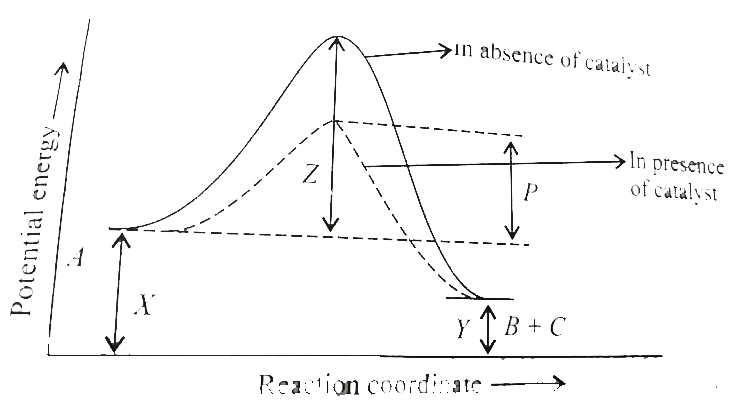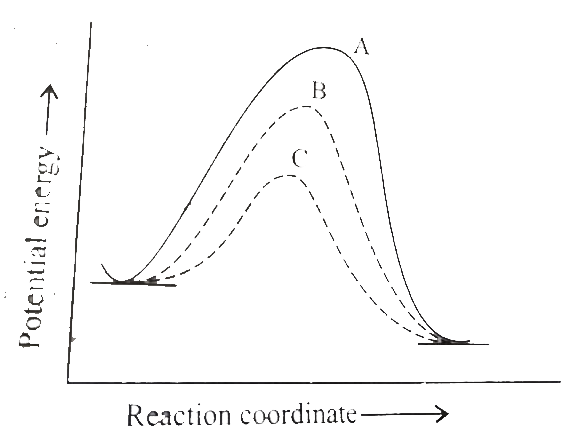Substances which alter the velocity of a reaction by mere presence, without undergoing any change in mass and compossition are termed catalyst and the phenomenon is known as catalysis
Which is incorrect for a catalyst?
A catalyst can initiate a reaction.
A catalyst remains uncharged in quality and composition at the end of reaction.
It does not alter the position of equilibrium in a reversible reaction.
Catalyst are sometimes very specific in reaction.
The correct Answer is:A
To determine which statement is incorrect regarding catalysts, we will evaluate each provided statement one by one.
1. Understanding the Role of a Catalyst:
- A catalyst is defined as a substance that alters the rate of a chemical reaction without undergoing any permanent change in its mass or composition.
2. Evaluating Each Statement:
- Statement A: "A catalyst can initiate a reaction."
- This statement is incorrect. A catalyst cannot initiate a reaction; it can only speed up or slow down a reaction that is already occurring by lowering the activation energy.
- Statement B: "A catalyst remains unchanged in quality and composition at the end of a reaction."
- This statement is correct. By definition, a catalyst does not change in mass or composition after the reaction.
- Statement C: "A catalyst does not alter the position of equilibrium in a reversible reaction."
- This statement is correct. A catalyst speeds up the rate at which equilibrium is reached but does not change the position of equilibrium itself.
- Statement D: "Catalysts are sometimes very specific in reaction."
- This statement is correct. Many catalysts are specific to particular reactions and cannot be used interchangeably.
3. Conclusion:
- The only incorrect statement regarding catalysts is Statement A: "A catalyst can initiate a reaction."
Final Answer:
The incorrect statement for a catalyst is Statement A: "A catalyst can initiate a reaction."
---
- A catalyst is defined as a substance that alters the rate of a chemical reaction without undergoing any permanent change in its mass or composition.
- Statement A: "A catalyst can initiate a reaction."
- This statement is incorrect. A catalyst cannot initiate a reaction; it can only speed up or slow down a reaction that is already occurring by lowering the activation energy.
- Statement B: "A catalyst remains unchanged in quality and composition at the end of a reaction."
- This statement is correct. By definition, a catalyst does not change in mass or composition after the reaction.
- Statement C: "A catalyst does not alter the position of equilibrium in a reversible reaction."
- This statement is correct. A catalyst speeds up the rate at which equilibrium is reached but does not change the position of equilibrium itself.
- Statement D: "Catalysts are sometimes very specific in reaction."
- This statement is correct. Many catalysts are specific to particular reactions and cannot be used interchangeably.
- The only incorrect statement regarding catalysts is Statement A: "A catalyst can initiate a reaction."
The incorrect statement for a catalyst is Statement A: "A catalyst can initiate a reaction."
Topper's Solved these Questions
- SURFACE CHEMISTRYBOOK - CENGAGE CHEMISTRY ENGLISHCHAPTER - SURFACE CHEMISTRYEXERCISE - Exercises Multiple Correct
25 Videos
- SURFACE CHEMISTRYBOOK - CENGAGE CHEMISTRY ENGLISHCHAPTER - SURFACE CHEMISTRYEXERCISE - Exercises Single Correct
52 Videos
- SURFACE CHEMISTRYBOOK - CENGAGE CHEMISTRY ENGLISHCHAPTER - SURFACE CHEMISTRYEXERCISE - Exercises Subjective
10 Videos
- SOLUTIONSBOOK - CENGAGE CHEMISTRY ENGLISHCHAPTER - SOLUTIONSEXERCISE - Ex 2.3 (Objective)
9 Videos
- SYNTHETIC AND NATURAL POLYMERSBOOK - CENGAGE CHEMISTRY ENGLISHCHAPTER - SYNTHETIC AND NATURAL POLYMERSEXERCISE - Exercises Assertion Reasoning
10 Videos
Similar Questions
Substances which alter the velocity of a reaction by mere presence, without undergoing any change in mass and compossition are termed catalyst and the phenomenon is known as catalysis
For the reaction (A→B+C) , the energy profile diagram is given in the figure below.

The decrease in the energy of activation in the presence of catalyst is
View SolutionSubstances which alter the velocity of a reaction by mere presence, without undergoing any change in mass and compossition are termed catalyst and the phenomenon is known as catalysis
In homogenous catalytic reactions, there are three alternative paths A, B, and C (shown in figure). Which one of the following indicates the relative ease with which the reaction can take place?

View Solution
Knowledge Check
Assertion : A catalyst increases the rate of reaction without itself undergoing any permanent chemical change.
Reason : A catalyst changes the Gibbs energy (ΔG) of the reaction and equilibrium constant of the reaction.AIf both assertion and reason are true and reason is the correct explanation of assertion.BIf both assertion and reason are true but reason is not the correct explanation of assertion.CIf assertion is true but reason is false.DIf both assertion and reason are false.
Substances which alter the velocity of a reaction by mere presence, without undergoing any change in mass and compossition are termed catalyst and the phenomenon is known as catalysis
According to the adsorption theroy of catalysis, the rate of reaction increases because
View SolutionTischenko reaction yields ester in the presence of catalyst which is :
View SolutionWhich of the following reaction parameters will change due to addition of a catalyst ?
View SolutionWhich of the following change (s) in the presence of catalyst ? (More than one correct answer)
View SolutionRedox is a reaction in which both oxidation and reduction will take place simultaneously . It is obvious that if one substance gives electron there must be another substance to accept these electrons . In some reactions, same substance is reduced as well as oxidised, these reactions are termed as disproportionation reactions.
For calculating equivalent mass in redox reaction change in oxidtaion number is realted to n-factor which is reciprocal of molar ratio.
Which of the following is an example of redox reaction ?
View SolutionRedox is a reaction in which both oxidation and reduction will take place simultaneously . It is obvious that if one substance gives electron there must be another substance to accept these electrons . In some reactions, same substance is reduced as well as oxidised, these reactions are termed as disproportionation reactions.
For calculating equivalent mass in redox reaction change in oxidtaion number is realted to n-factor which is reciprocal of molar ratio.
When P reacts with NaOH, the products are PH3 and NaH2PO2 which of the following statement is correct ?
View SolutionRedox is a reaction in which both oxidation and reduction will take place simultaneously . It is obvious that if one substance gives electron there must be another substance to accept these electrons . In some reactions, same substance is reduced as well as oxidised, these reactions are termed as disproportionation reactions.
For calculating equivalent mass in redox reaction change in oxidtaion number is realted to n-factor which is reciprocal of molar ratio.
This reaction is an example of
Br2+OH−→BrO−3+H2O+Br−
View Solution
